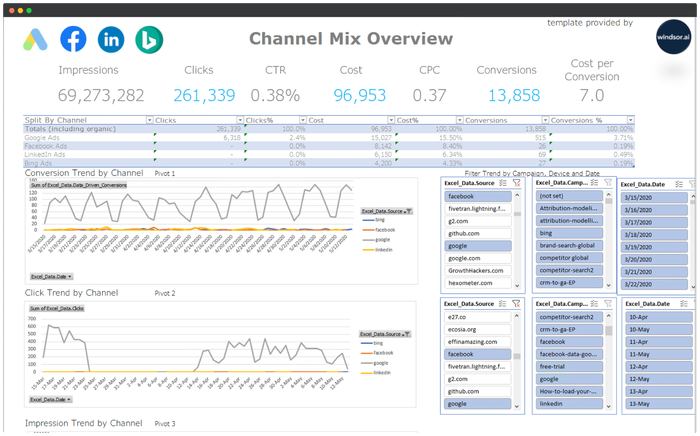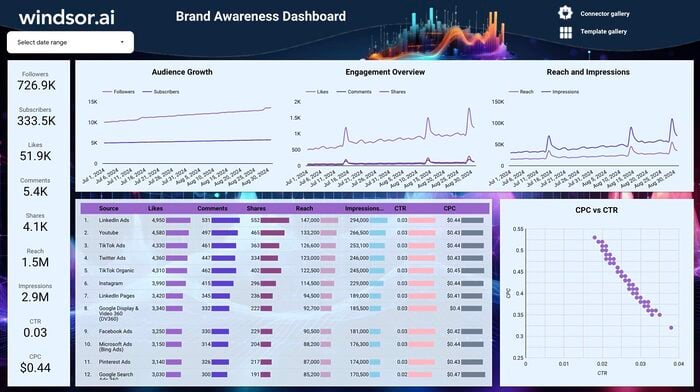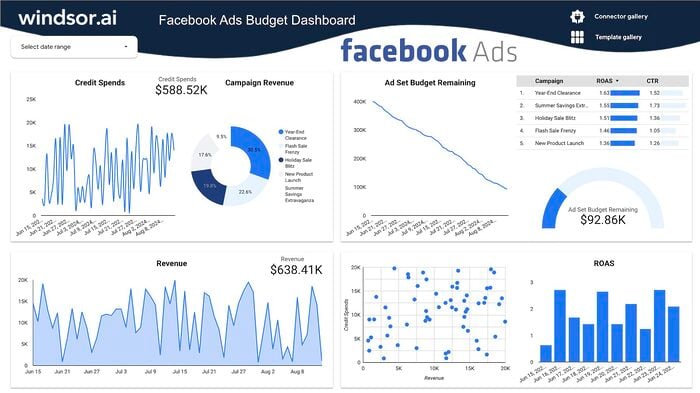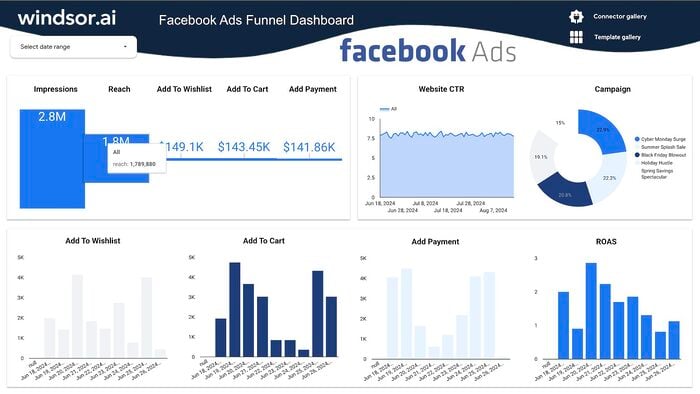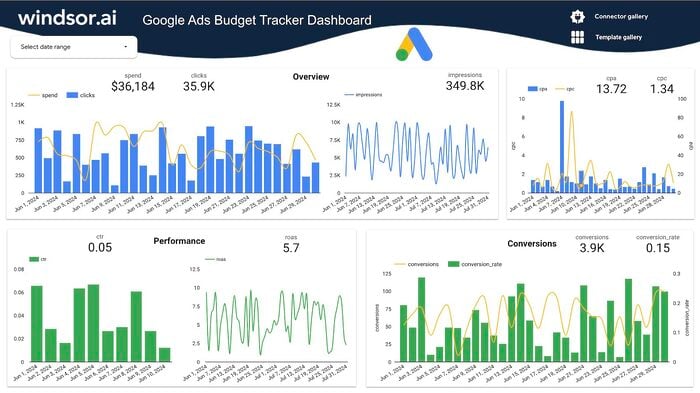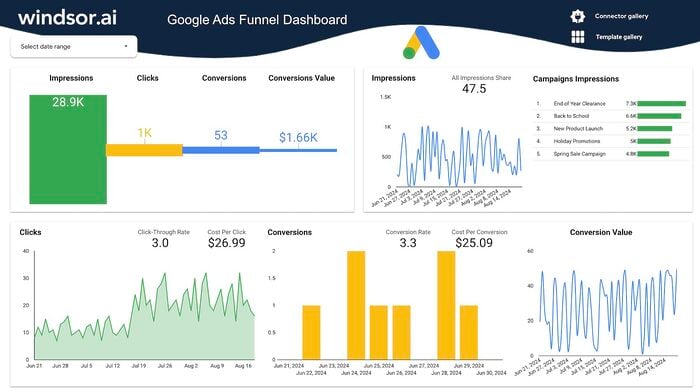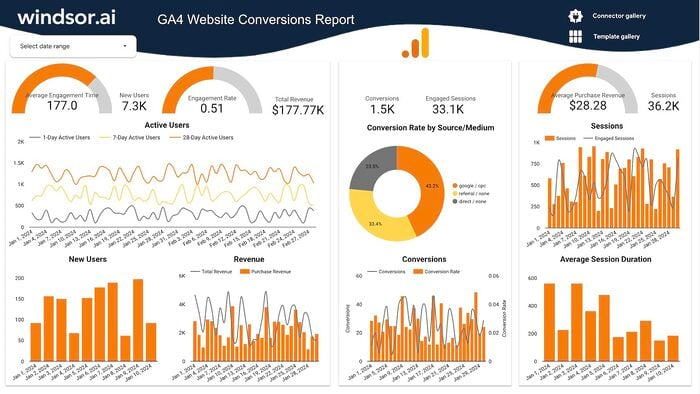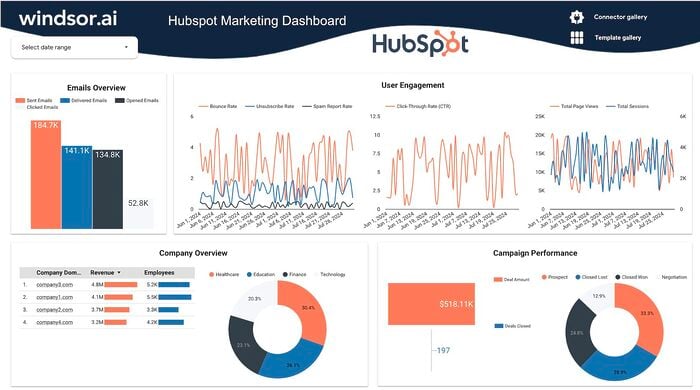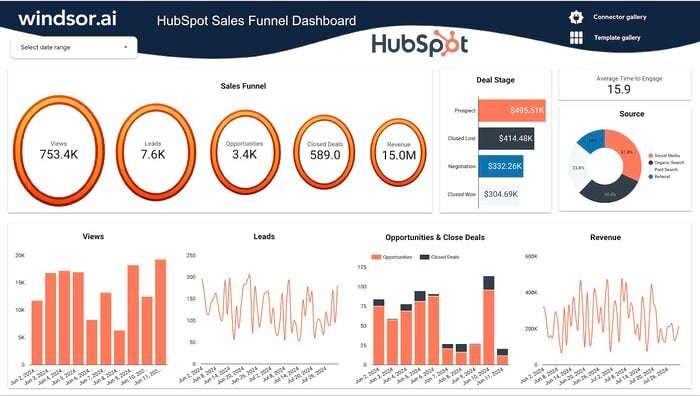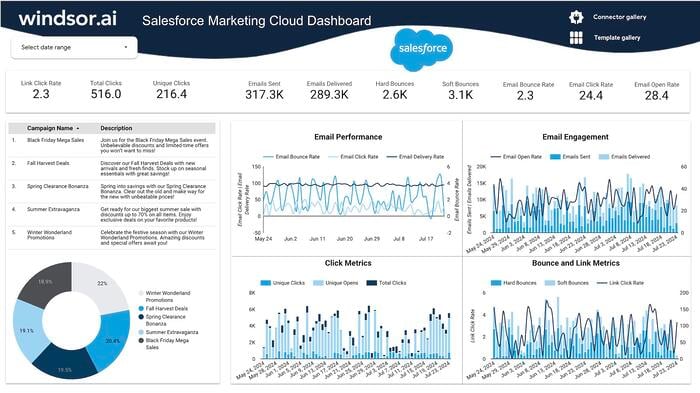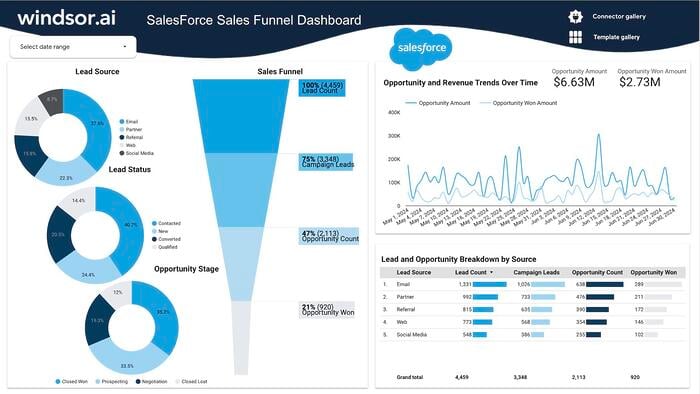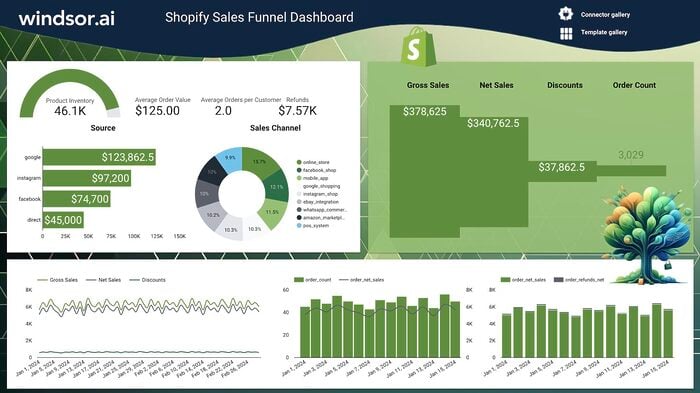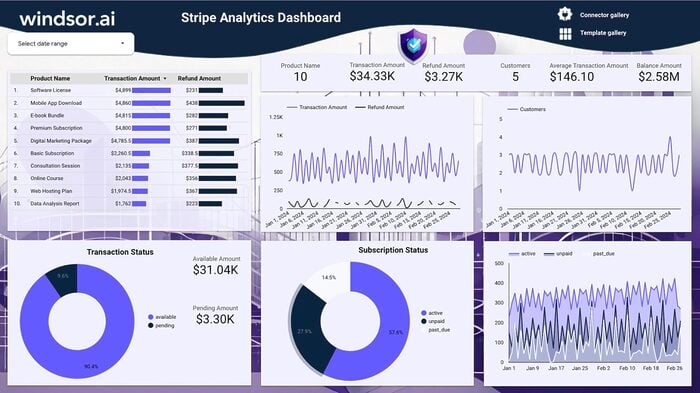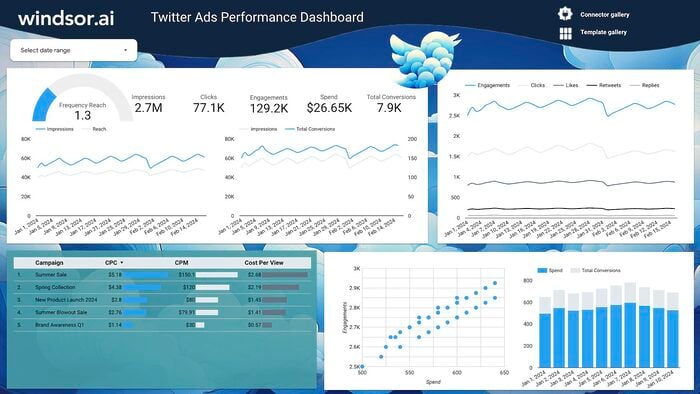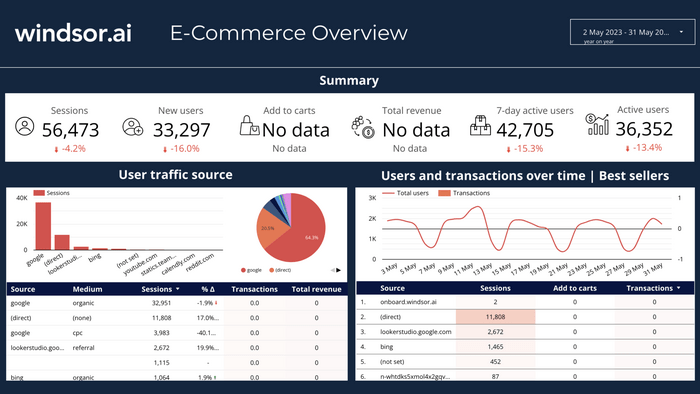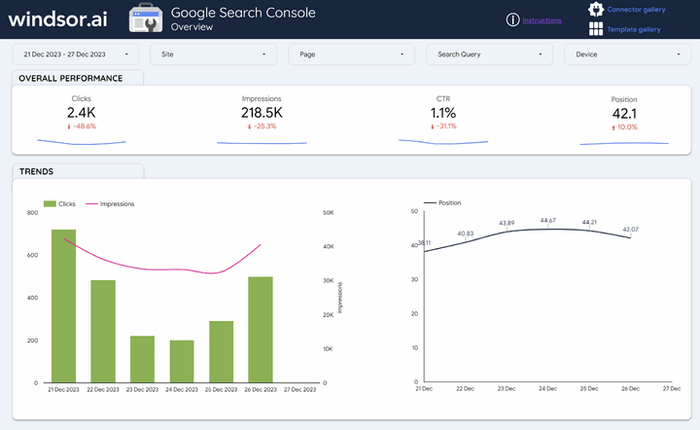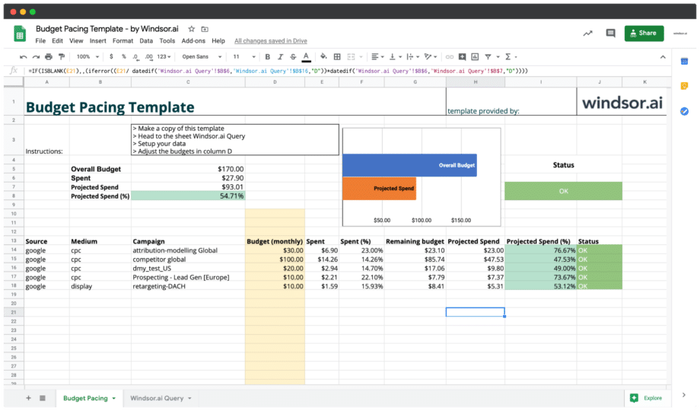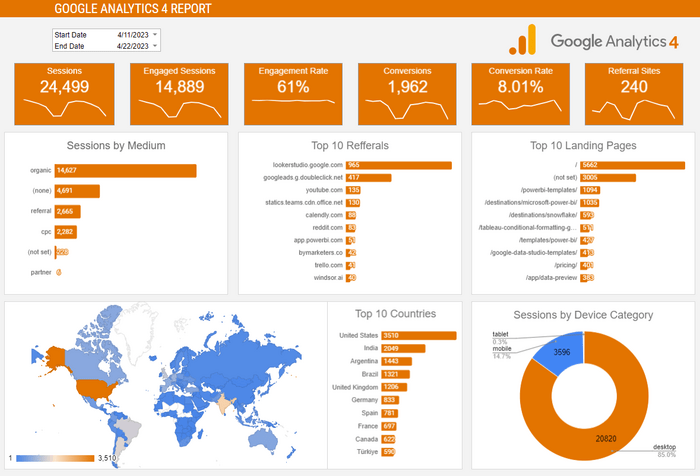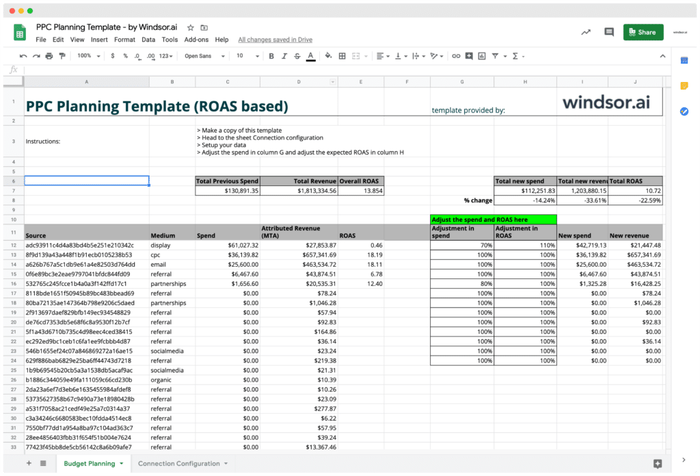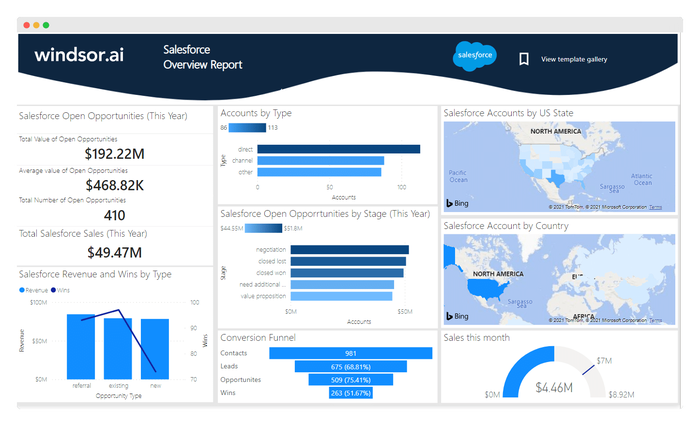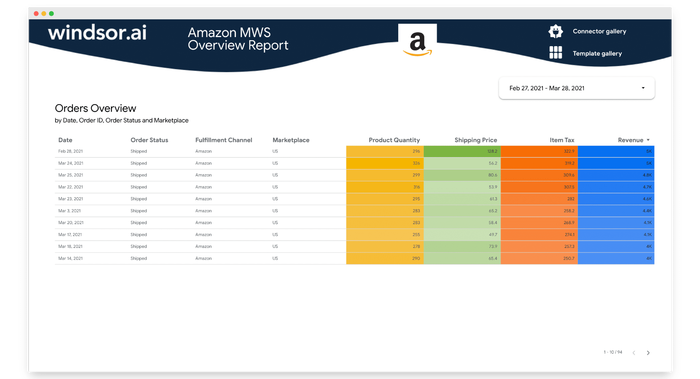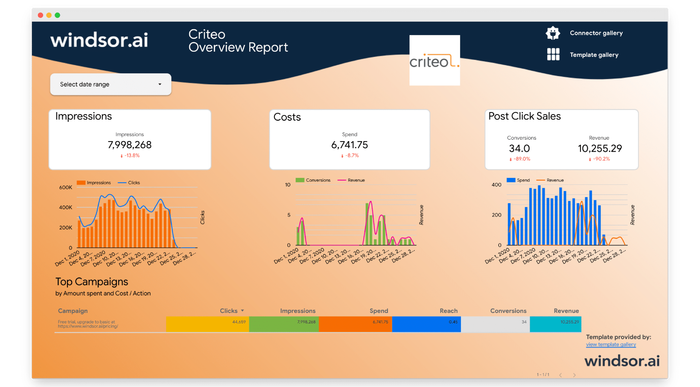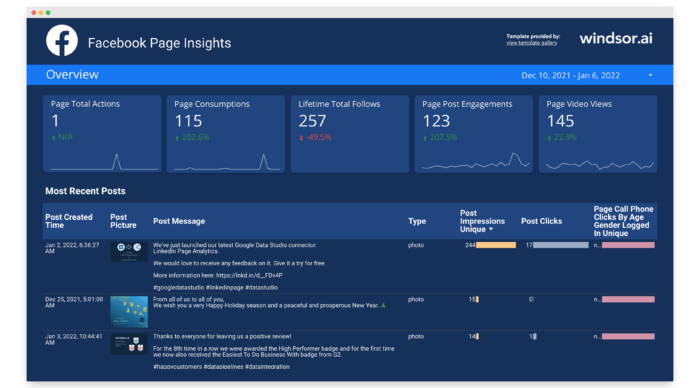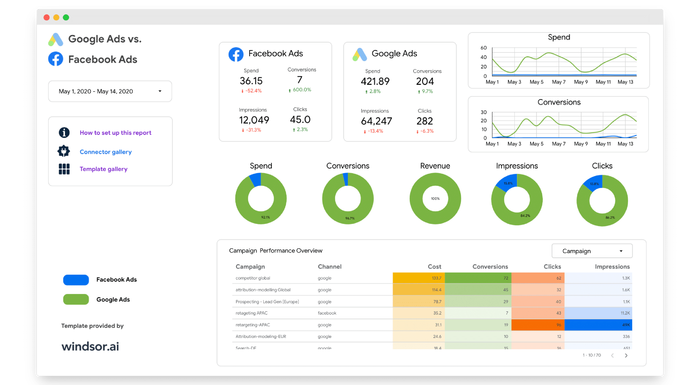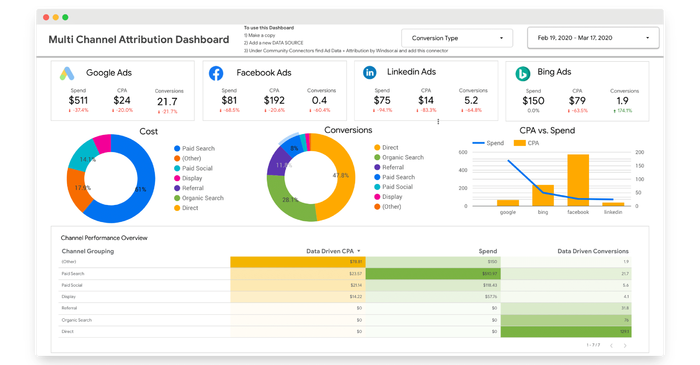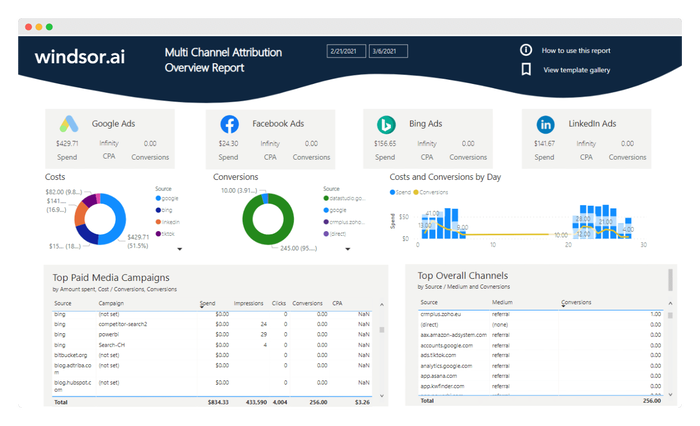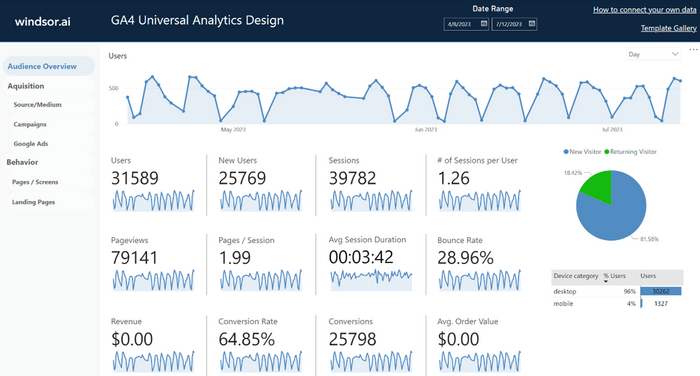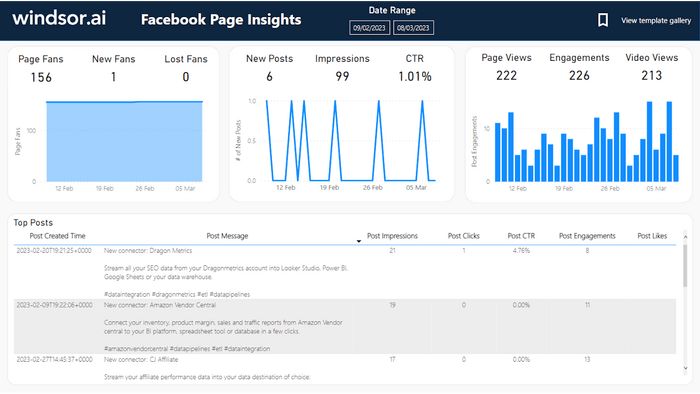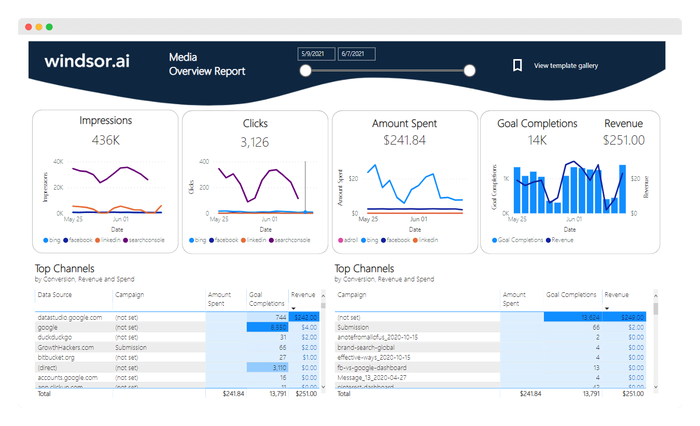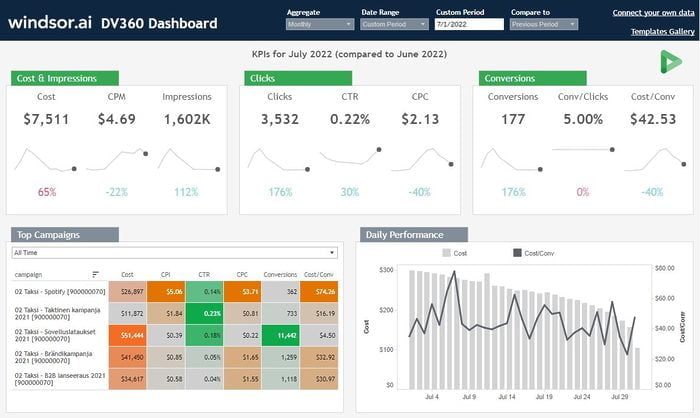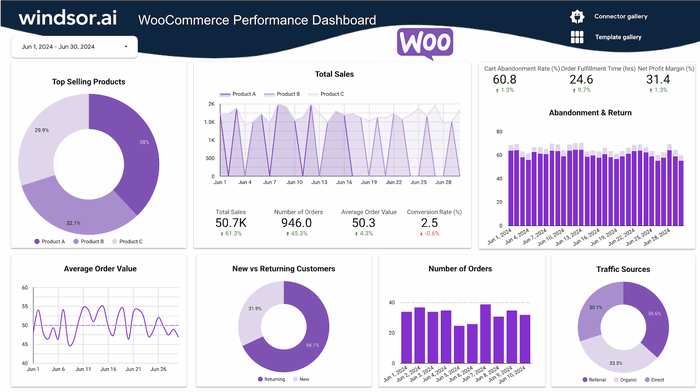Free Marketing Dashboard Templates
Create powerful marketing dashboards with Windsor.ai’s pre-built, customizable templates, expertly designed for diversified channels and analytics needs.
Our free marketing dashboard templates come with easy-to-follow instructions, so you can install them and connect your data in just a few clicks with no complex technical configurations.
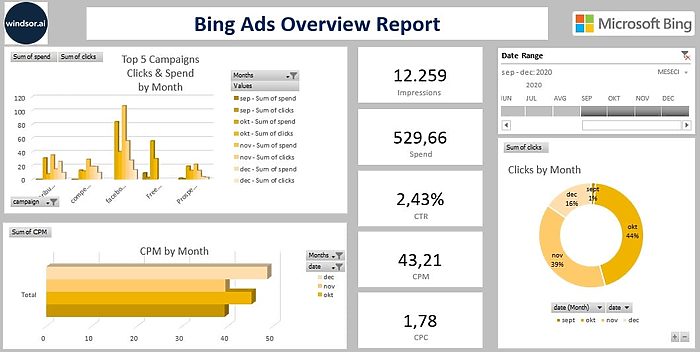
Excel Bing Ads Overview Report Template

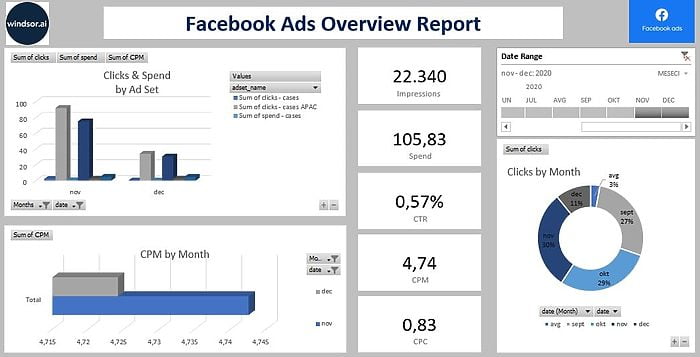
Excel Facebook Ads Overview Report Template

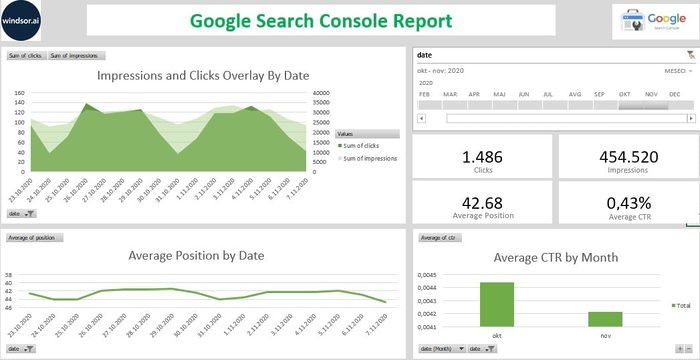
Excel Google Search Console Dashboard Template

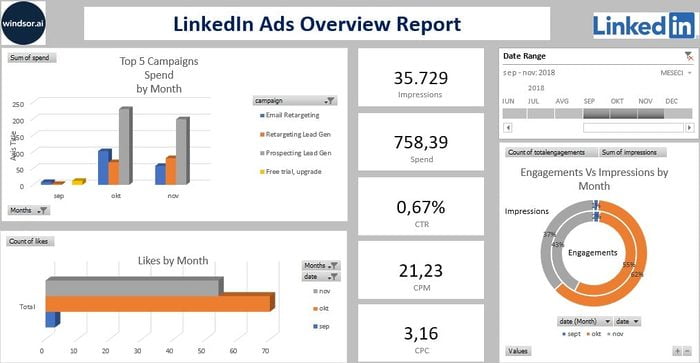
Excel LinkedIn Ads Overview Report Template

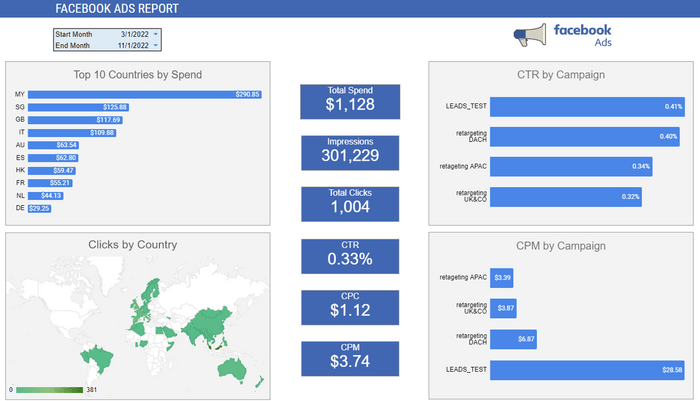
Facebook Ads Report Template for Google Sheets


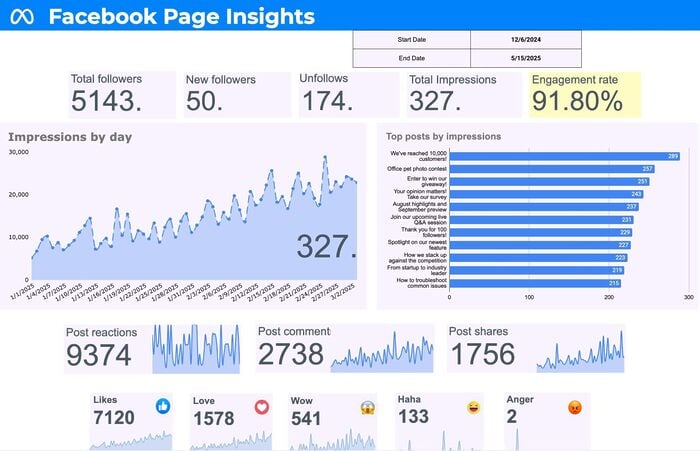
Facebook Page Insights Google Sheets Dashboard Template


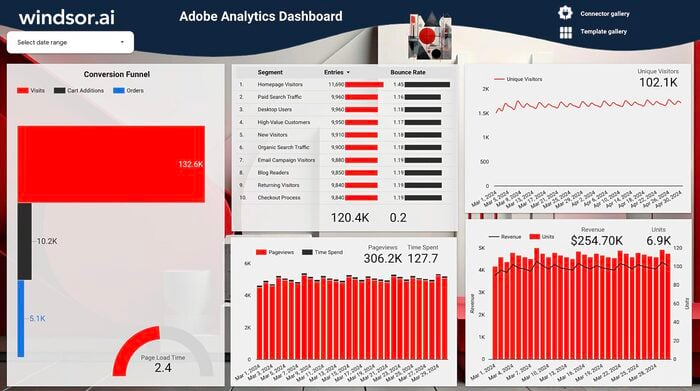
Free Adobe Analytics Dashboard Template on Looker Studio

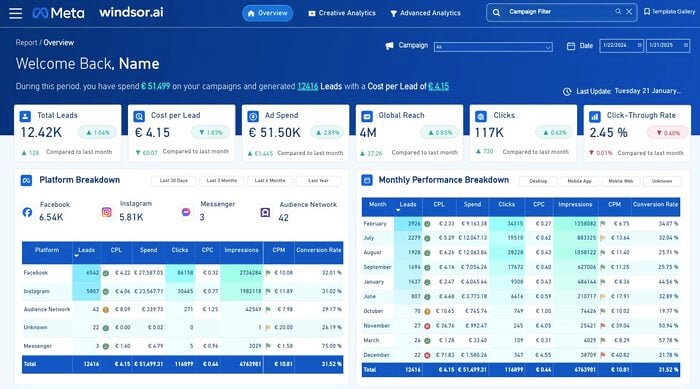
Free Facebook Ads Power BI Dashboard Template


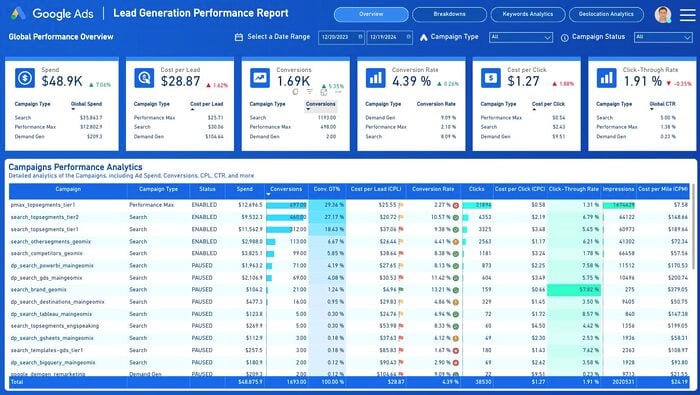
Free Google Ads Power BI Dashboard Template


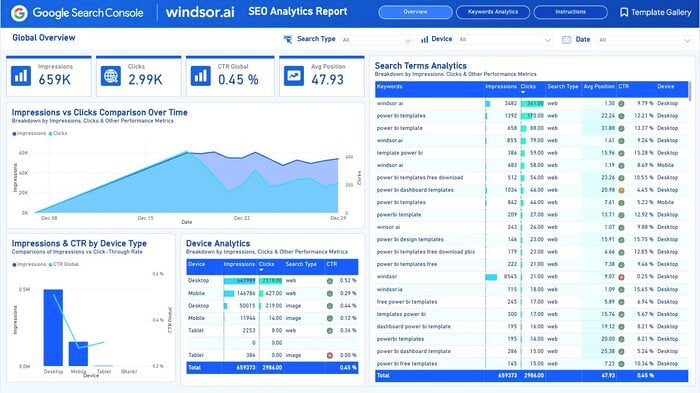
Free Google Search Console Power BI Template


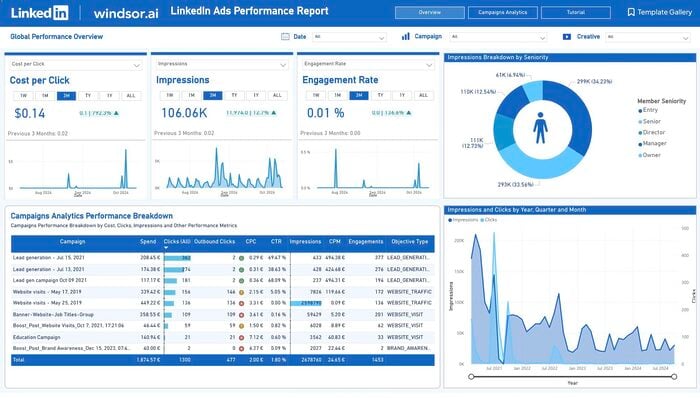
Free LinkedIn Ads Dashboard Template on Power BI


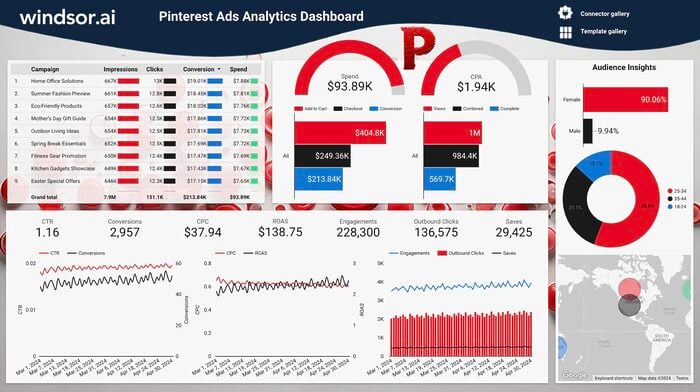
Free Pinterest Ads Dashboard Template on Looker Studio

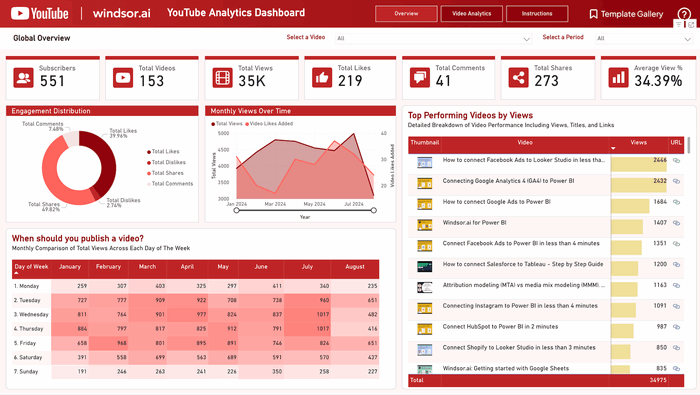
Free Power BI YouTube Analytics Dashboard Templates


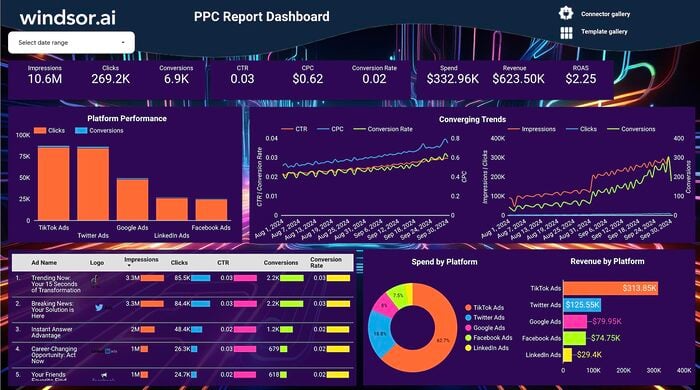
Free PPC Report Dashboard Template on Looker Studio





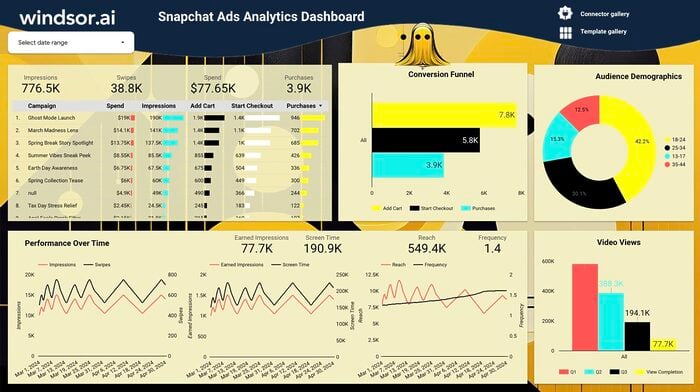
Free Snapchat Ads Dashboard Template on Looker Studio

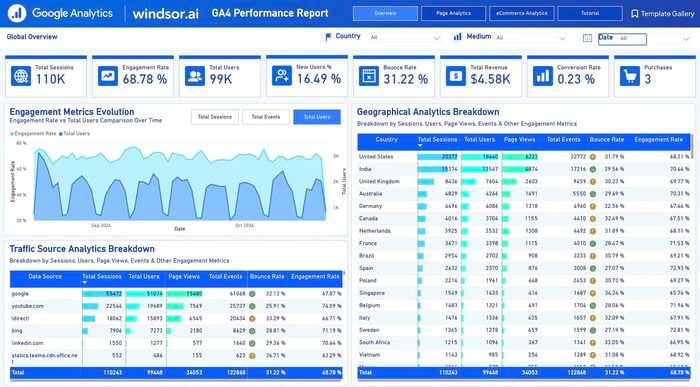
Google Analytics 4 (GA4) Dashboard Template on Power BI



Google Business Profile Google Sheets Template



Google Search Console Google Sheets Template


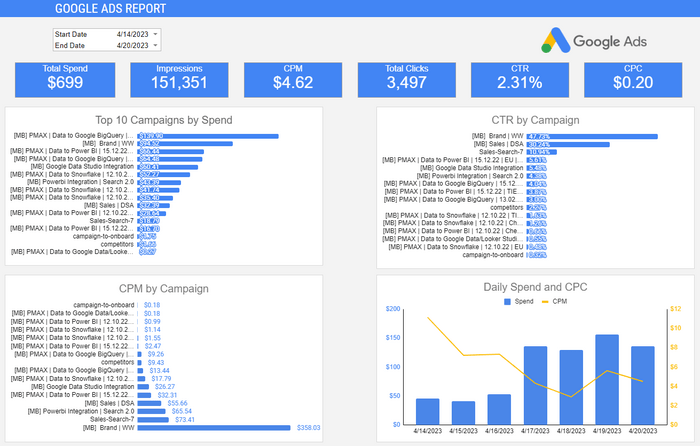
Google Sheets Google Ads Report Dashboard Template


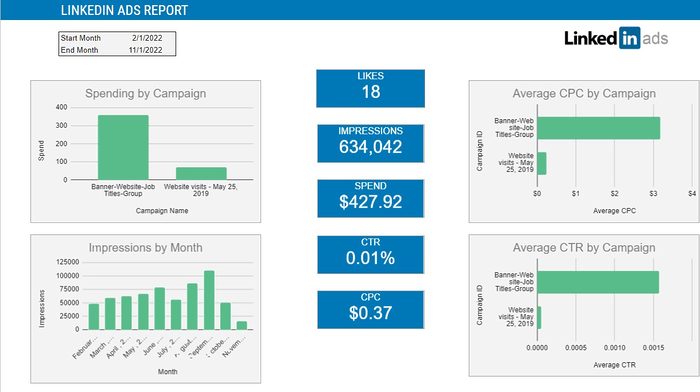
Google Sheets LinkedIn Ads Overview Report



How to Connect Linkedin Ads to Looker Studio

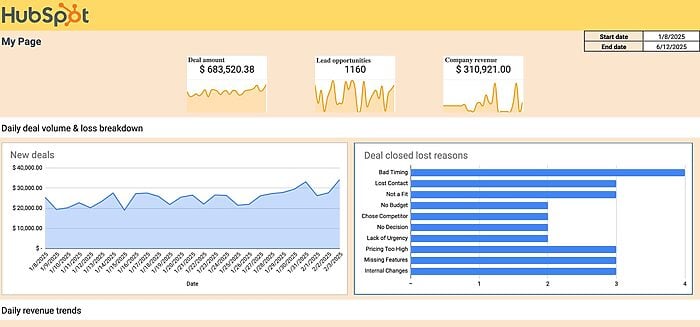
Hubspot Google Sheets Dashboard Template



Instagram Ads Google Sheets dashboard template



Instagram Organic Google Sheets Dashboard Template


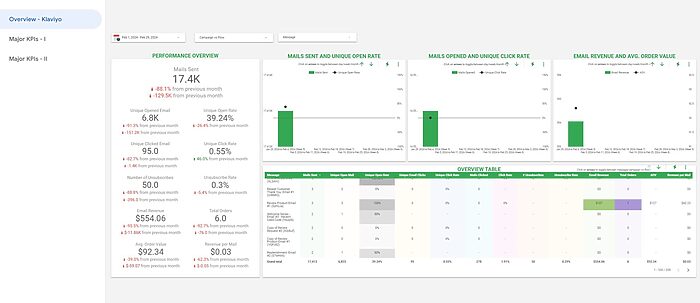
Klaviyo Looker Studio Dashboard

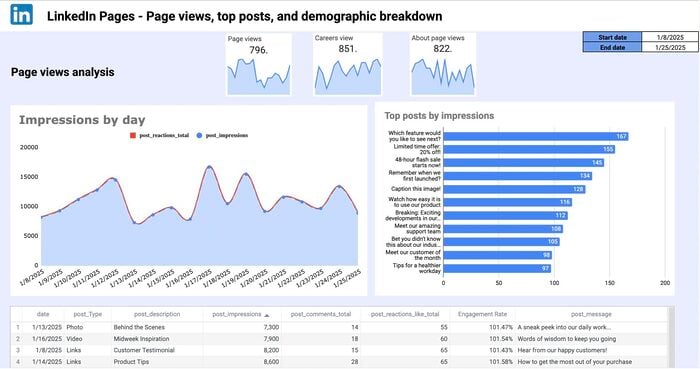
LinkedIn Page Google Sheets Report Template


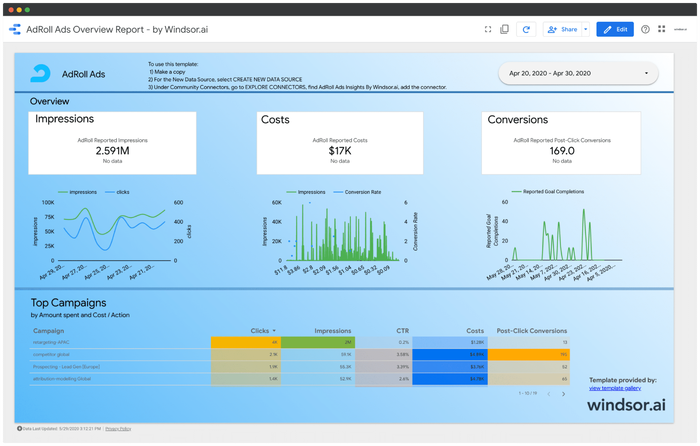
Looker Studio AdRoll Ads Overview Report

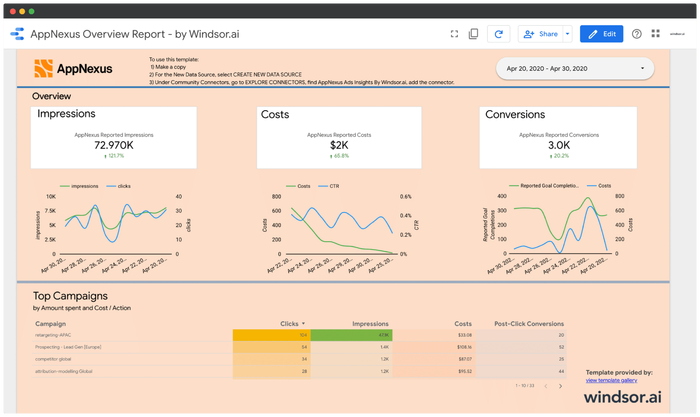
Looker Studio AppNexus Overview Report

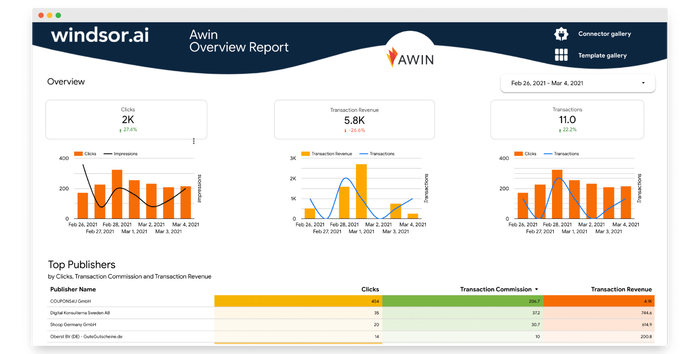
Looker Studio Awin Overview Report

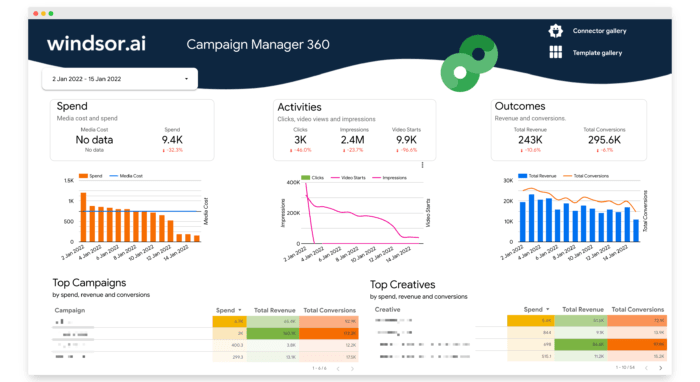
Looker Studio Campaign Manager 360 (DCM) Overview Report

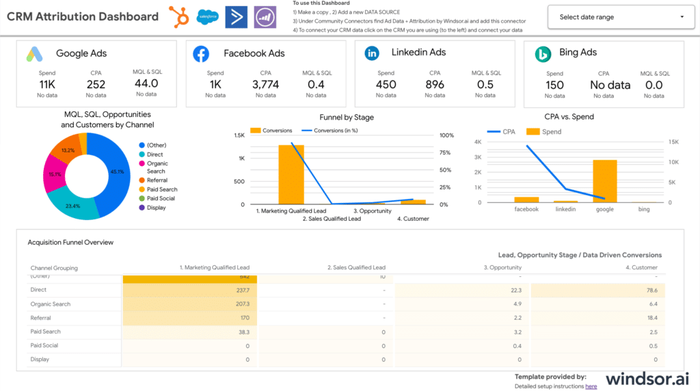
Looker Studio CRM Attribution Dashboard Template







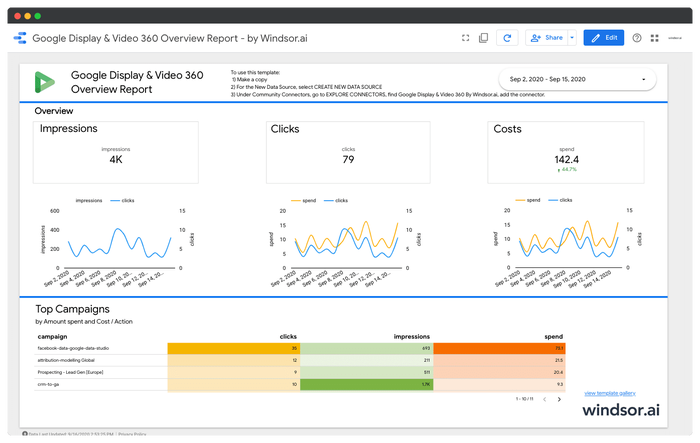
Looker Studio DV 360 Overview Report

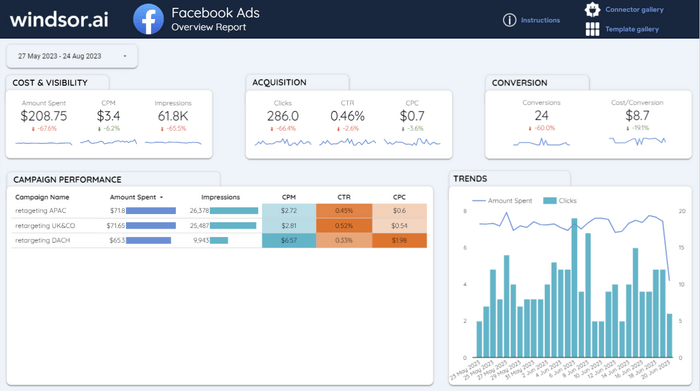
Looker Studio Facebook Ads Dashboard Template

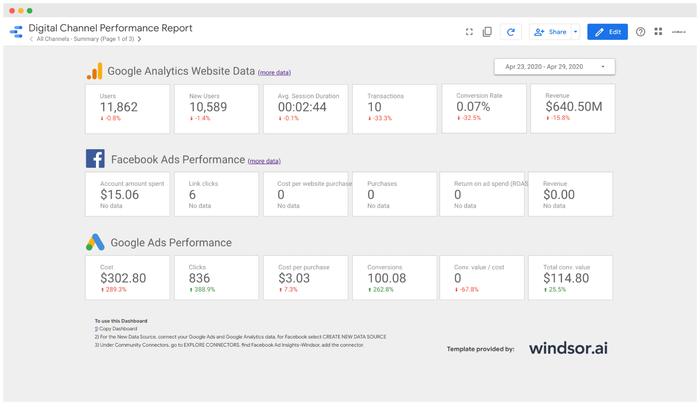
Looker Studio Facebook Ads E-commerce Dashboard Template



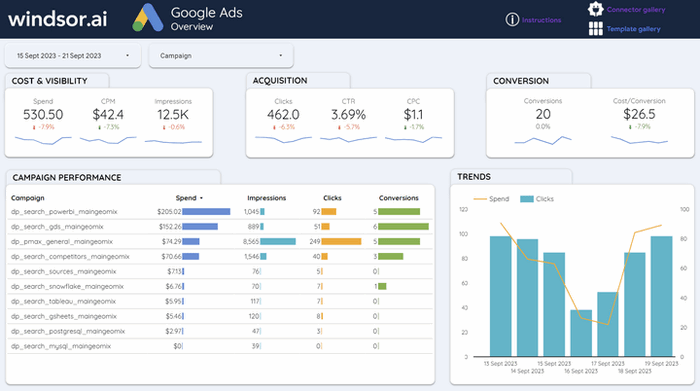
Looker Studio Google Ads Dashboard Template


Looker Studio Google Analytics 4 Dashboard Template


Looker Studio Google My Business Dashboard Template

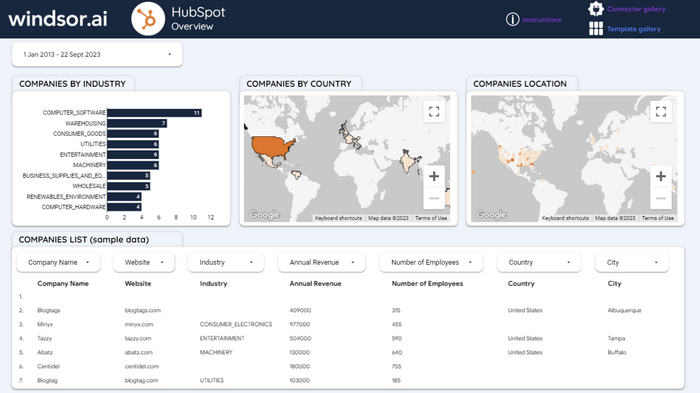
Looker Studio HubSpot Dashboard Template

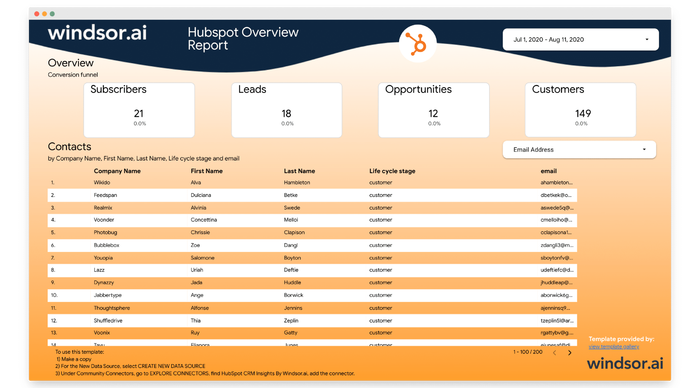
Looker Studio HubSpot Overview Report

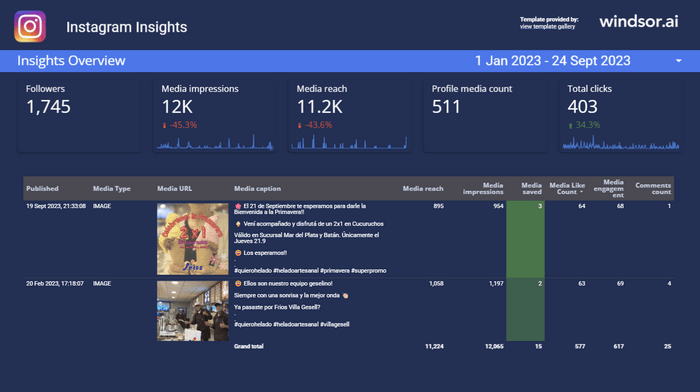
Looker Studio Instagram Insights Overview Report


Looker Studio LinkedIn Ads Dashboard Template

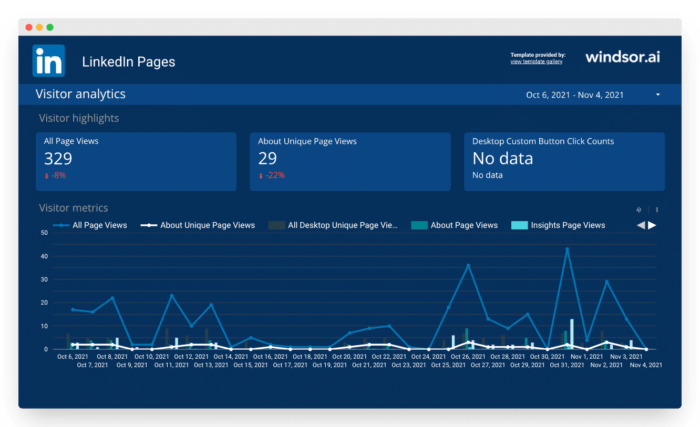
Looker Studio LinkedIn Pages Overview Report

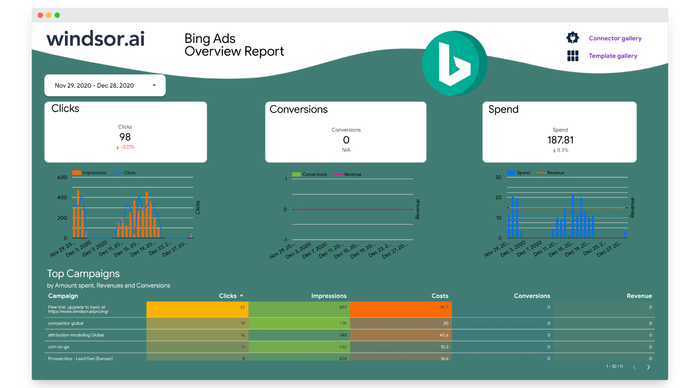
Looker Studio Microsoft Ads Overview Report

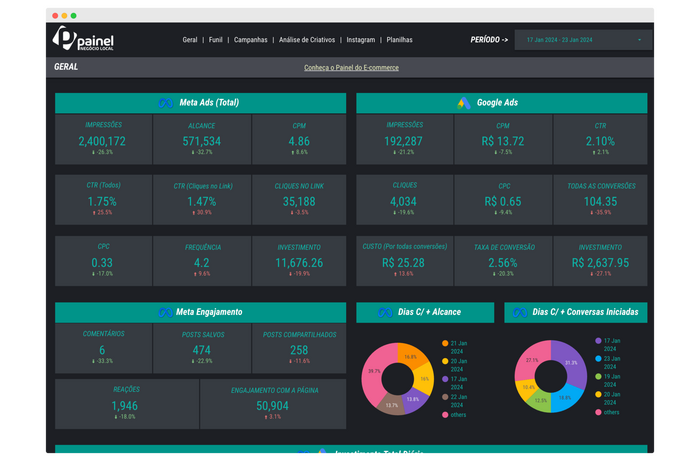
Looker Studio Painel Para Negócios Locais




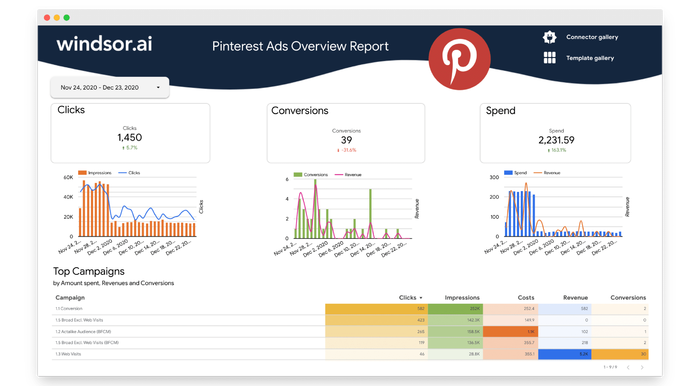
Looker Studio Pinterest Ads Overview Report

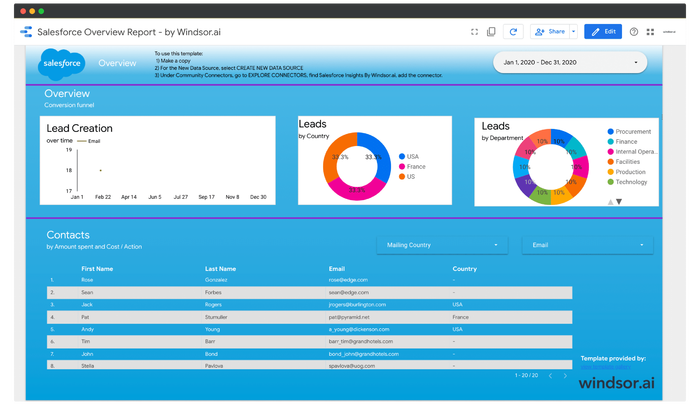
Looker Studio Salesforce Overview Report

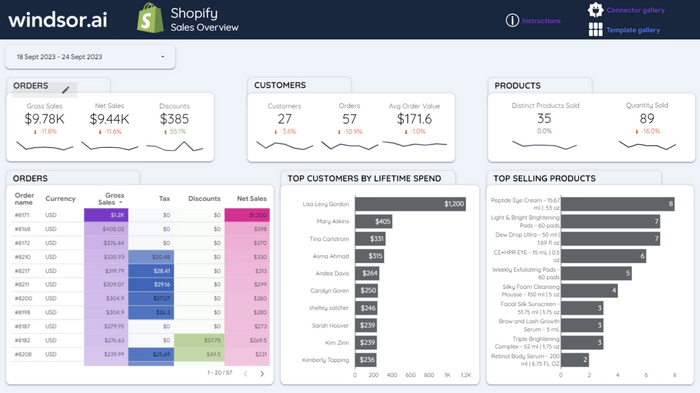
Looker Studio Shopify Dashboard Template

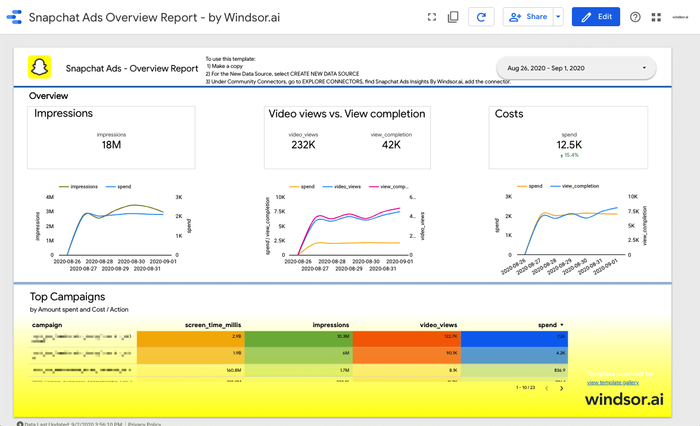
Looker Studio Snapchat Ads Overview Report

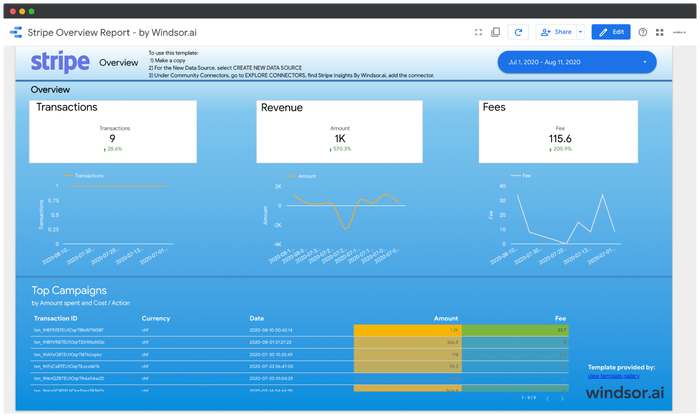
Looker Studio Stripe Overview Report

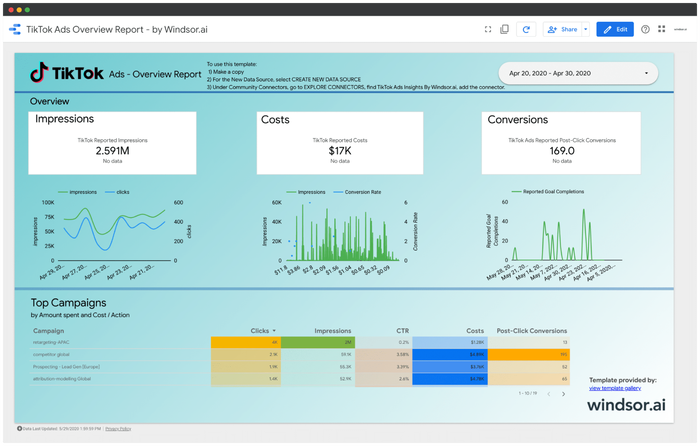
Looker Studio TikTok Ads Overview Report

Looker Studio Youtube Channel Dashboard Template

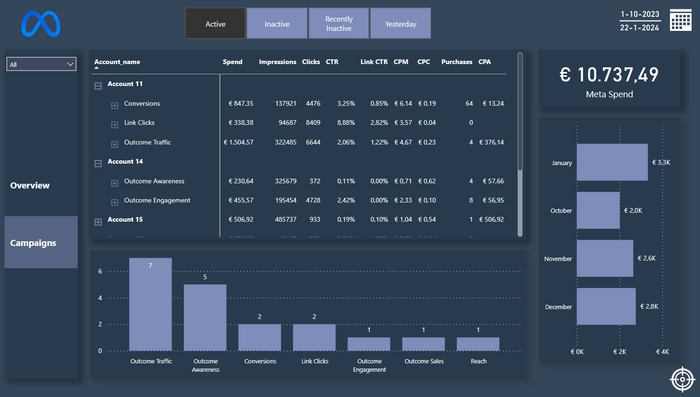
Meta Ads Template for Power BI


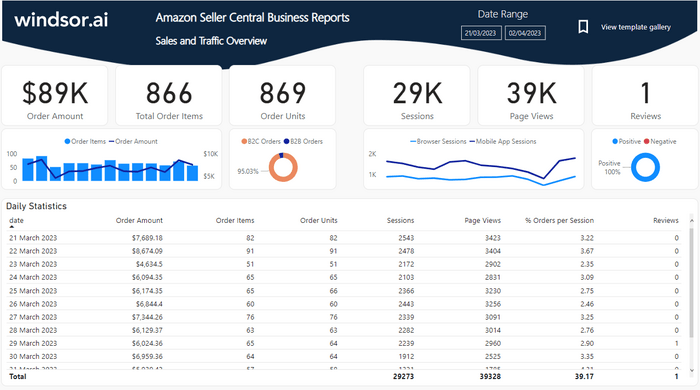
Power BI Amazon Report Dashboard Template


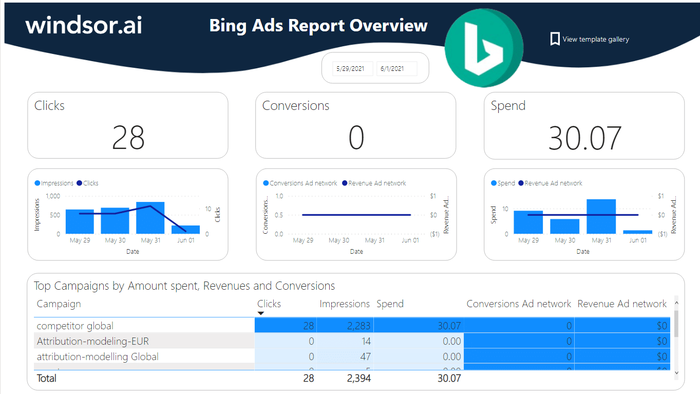
Power BI Bing Ads Report Dashboard Template


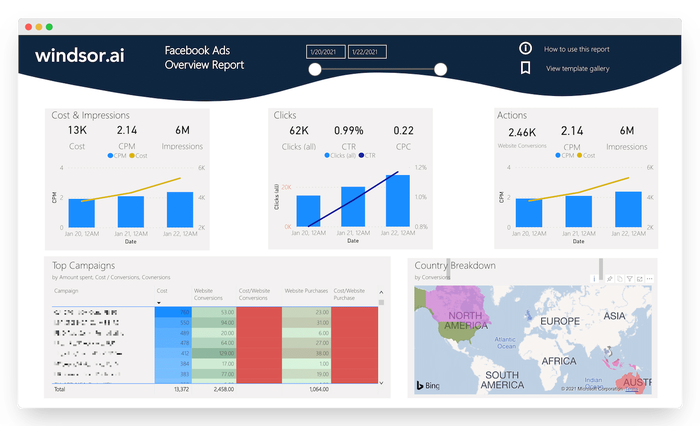
Power BI Facebook Ads Report Dashboard Template


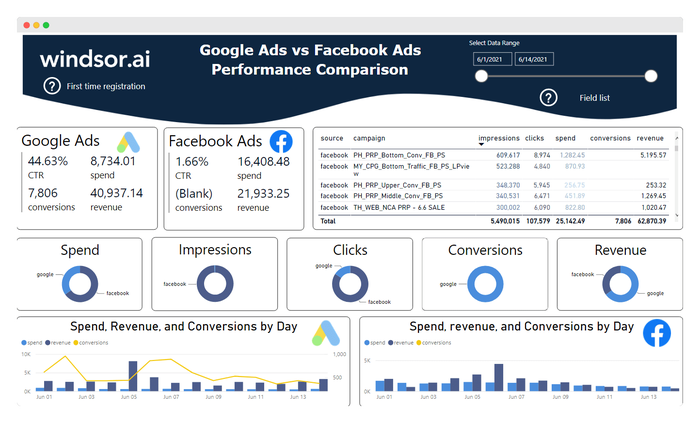
Power BI Facebook Ads vs Google Ads Report Template



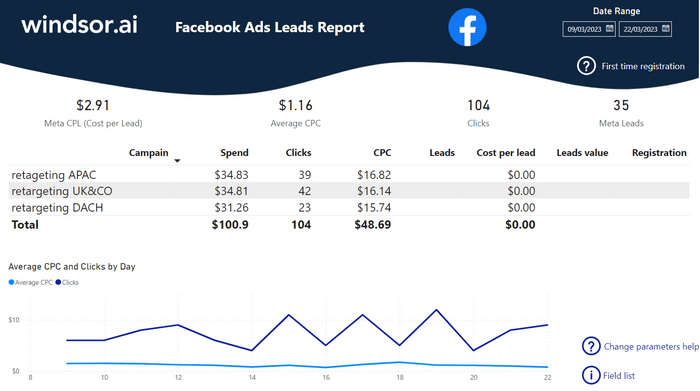
Power BI Facebook Leads Report Dashboard Template


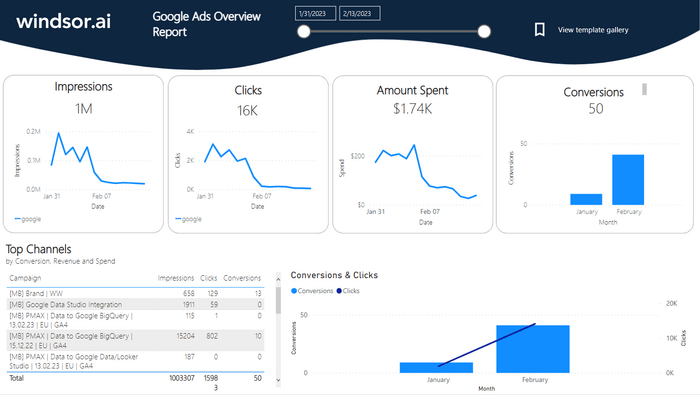
Power BI Google Ads Dashboard Template


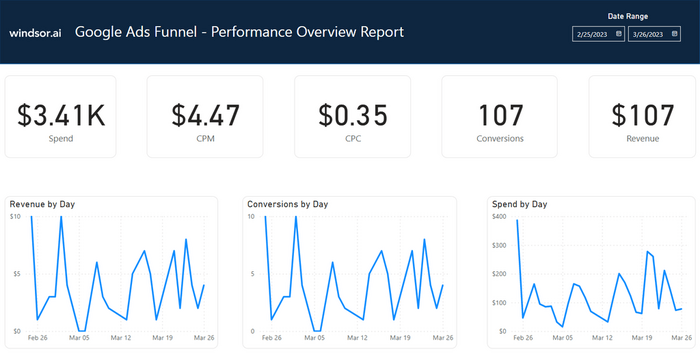
Power BI Google Ads Funnel Overview Dashboard Template


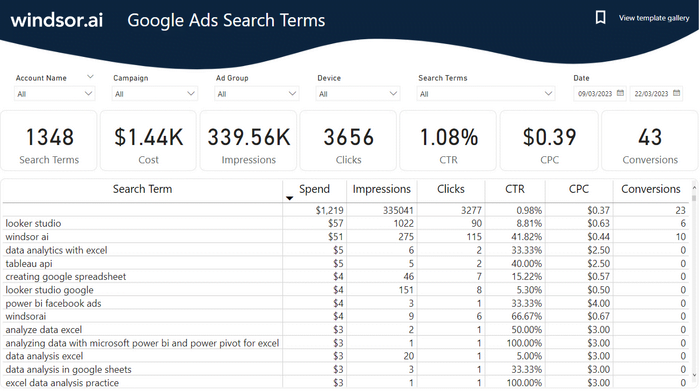
Power BI Google Ads Search Term Dashboard Template


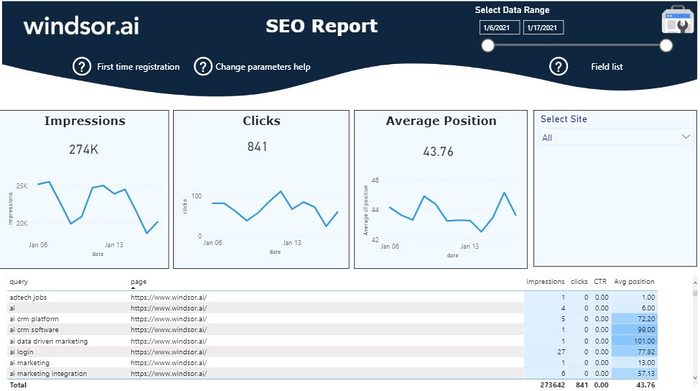
Power BI Google Search Console Report Dashboard Template


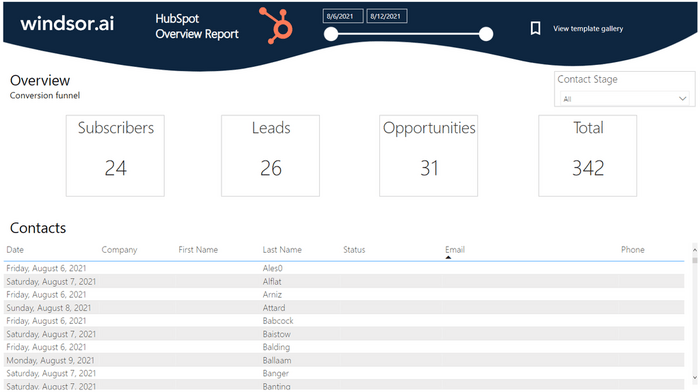
Power BI HubSpot Overview Dashboard Template


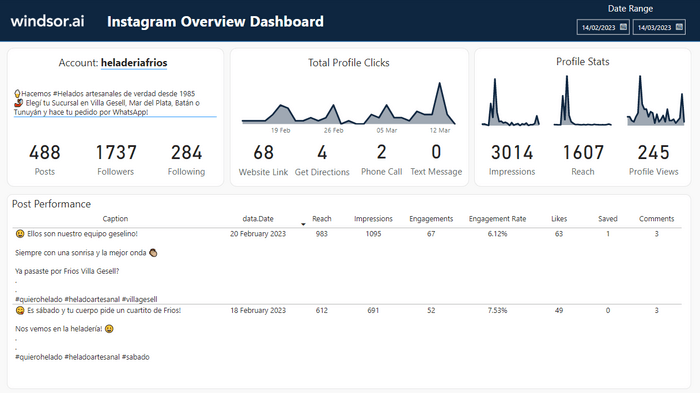
Power BI Instagram Dashboard Template


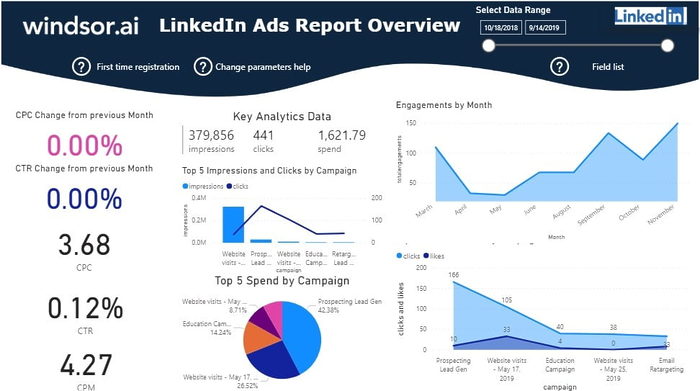
Power BI LinkedIn Ads Report Dashboard Template


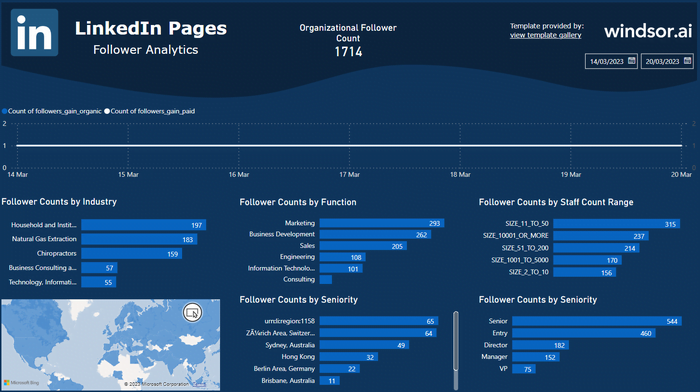
Power BI LinkedIn Page Insights Dashboard Template


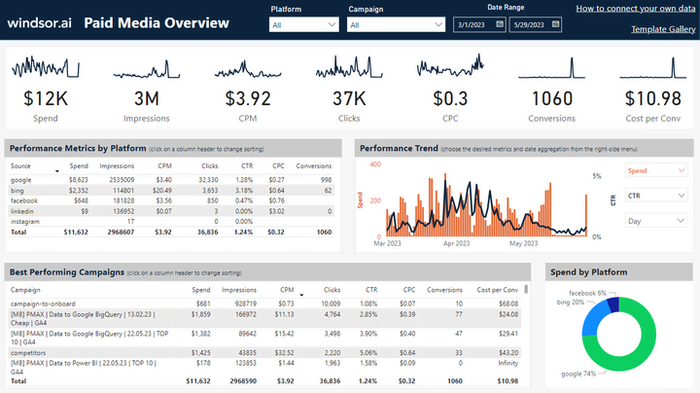
Power BI Paid Media Overview Dashboard Template











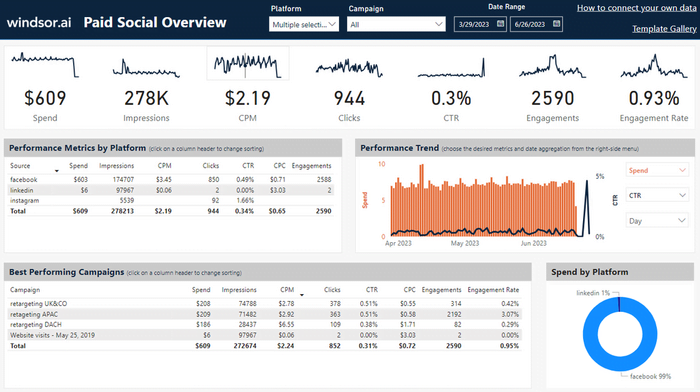
Power BI Paid Social Media Overview Dashboard Template







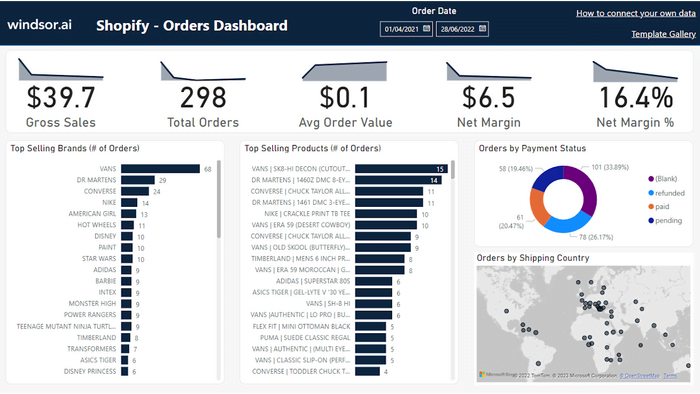
Power BI Shopify Overview Dashboard Template


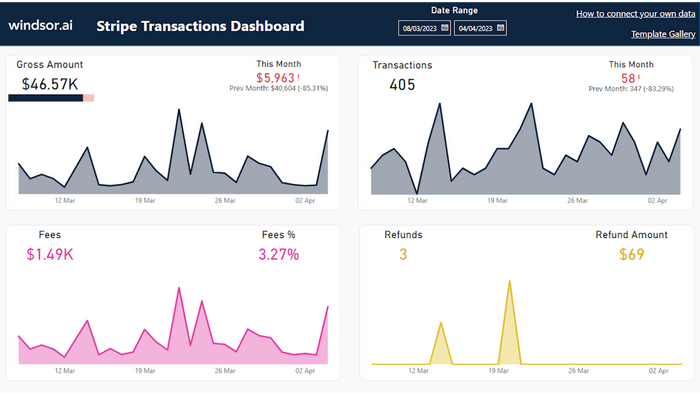
Power BI Stripe Transactions Dashboard Template


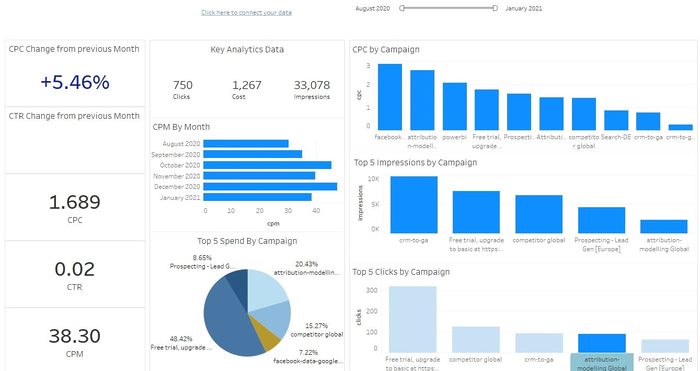
Tableau Bing Ads Overview Dashboard Template


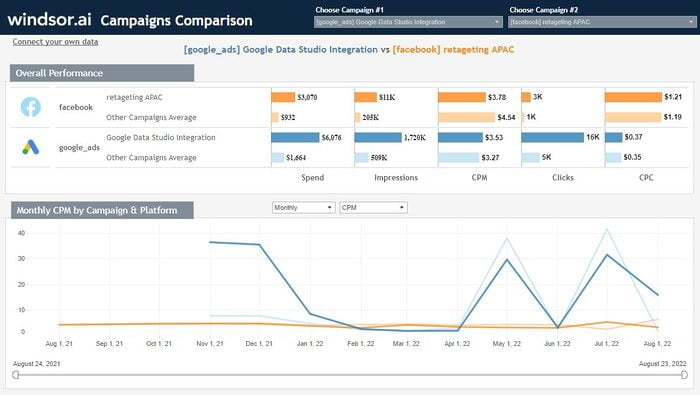
Tableau Compare Campaigns Performance Dashboard Template








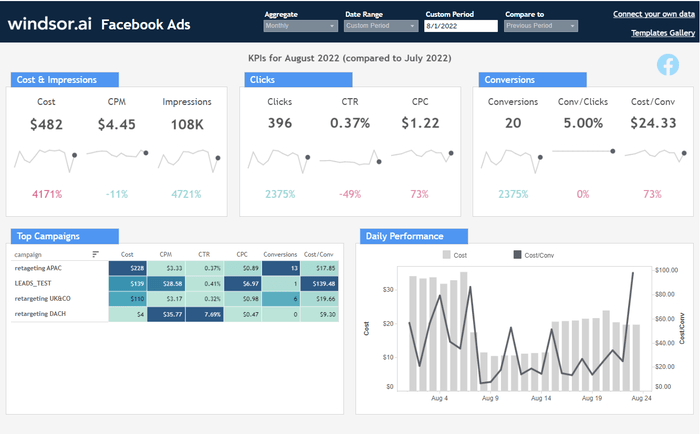
Tableau Facebook Ads Report Dashboard Template


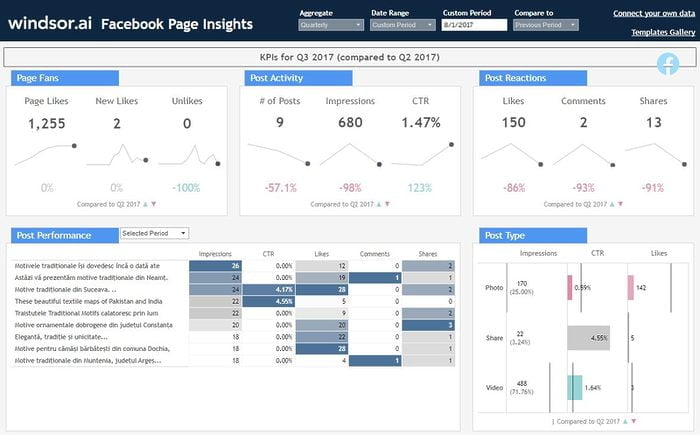
Tableau Facebook Page Insights Dashboard Template


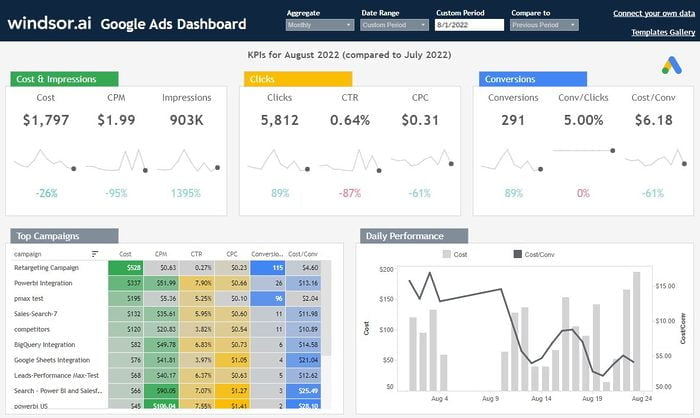
Tableau Google Ads Dashboard Template


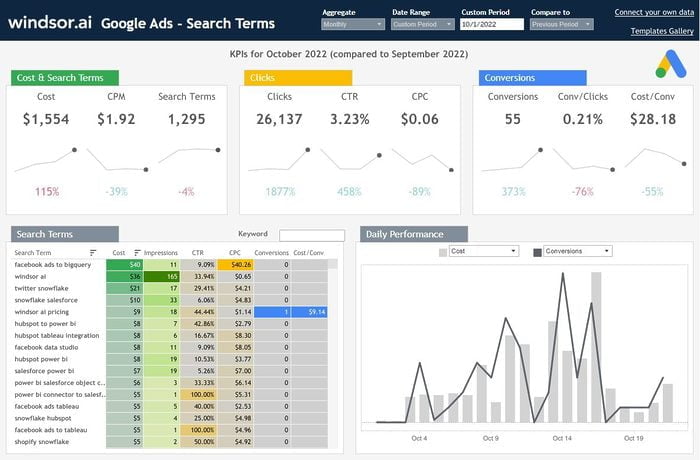
Tableau Google Ads Search Queries Dashboard Template


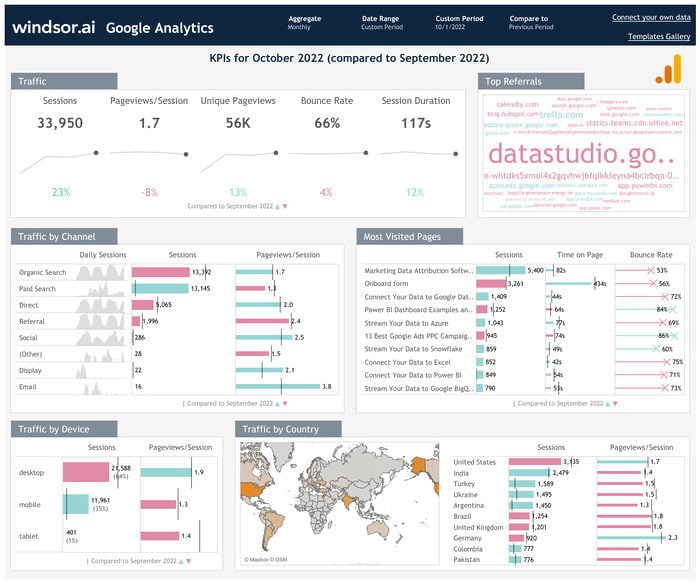
Tableau Google Analytics Dashboard Template


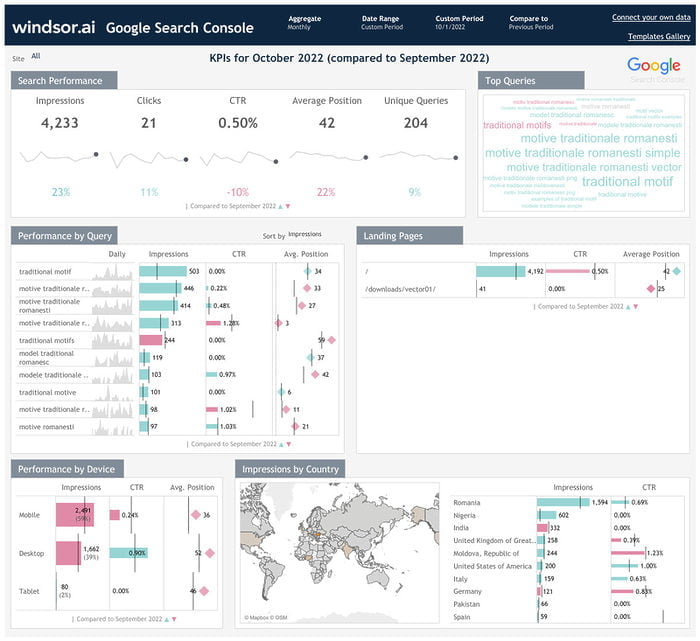
Tableau Google Search Console Dashboard Template


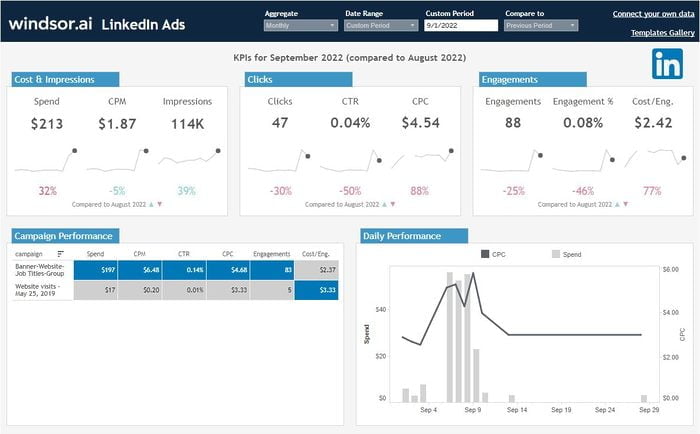
Tableau LinkedIn Ads Dashboard Template


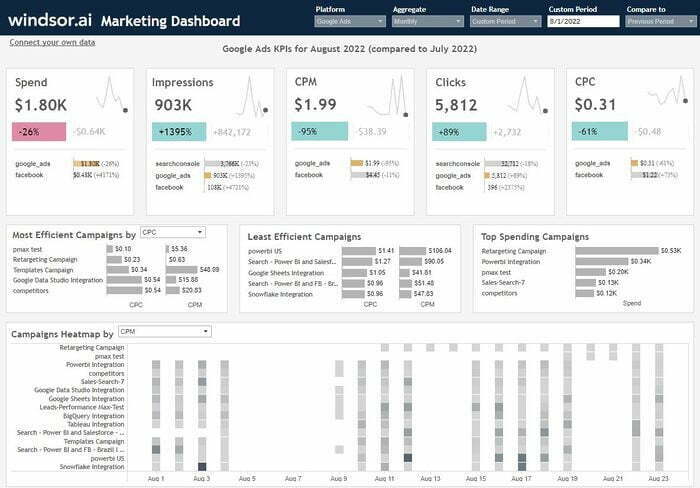
Tableau Multichannel Attribution Dashboard Template









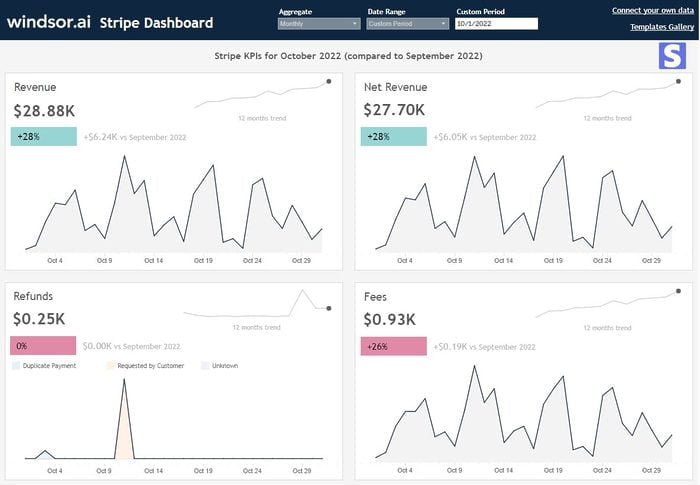
Tableau Stripe Dashboard Template


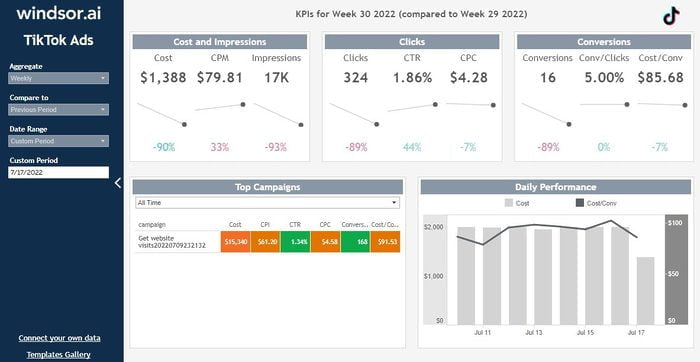
Tableau TikTok Ads Dashboard Template

Top marketing dashboard templates from Windsor.ai
With Windsor.ai’s extensive library of marketing dashboard templates, it can be challenging to find the ones that best suit your unique business needs.
When choosing the most suitable template, consider the core metrics your organization tracks, understand how your data aligns with your business goals, and define your target audience.
To simplify your choice, we’ve compiled a list of the most popular templates on Windsor.ai that are sure to be helpful:
- Social Media Dashboards
- SEO Analytics Dashboards
- PPC Dashboards
- Google Analytics 4 Dashboards
- Content Marketing Dashboards
- Email Marketing Dashboards
- Web Analytics Dashboards
- Lead Generation Dashboards
- E-commerce Marketing Dashboards
- LinkedIn Ads Dashboards
- Google Ads Dashboards
- Facebook Ads Dashboards
- CMO Dashboards
- CRM Dashboards
- Amazon Dashboards
- YouTube Ads Dashboards
- Shopify Dashboards
- TikTok Ads Dashboards
- Keyword Ranking Dashboards
- KPI Dashboards
How to set up Windsor.ai's marketing dashboard templates
Set up the connector(s) in Windsor.ai
Connect the necessary data source(s) and destination for using this template in your Windsor.ai dashboard.

Set up the template
Once you finish installing the connector, open the necessary template page and set it up according to the instructions.

Customize the created report
Now, you can customize the created report by adding necessary fields and parameters.
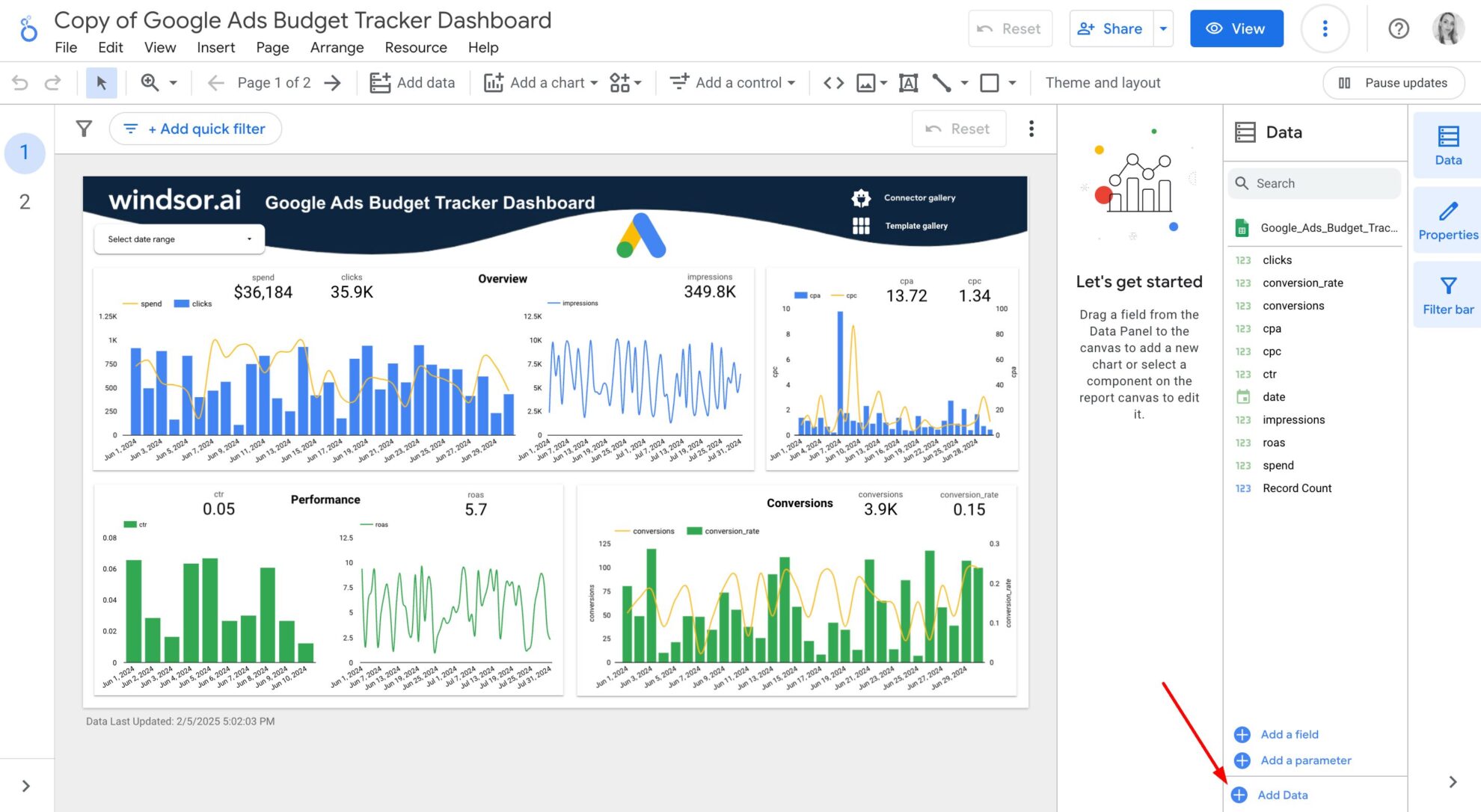
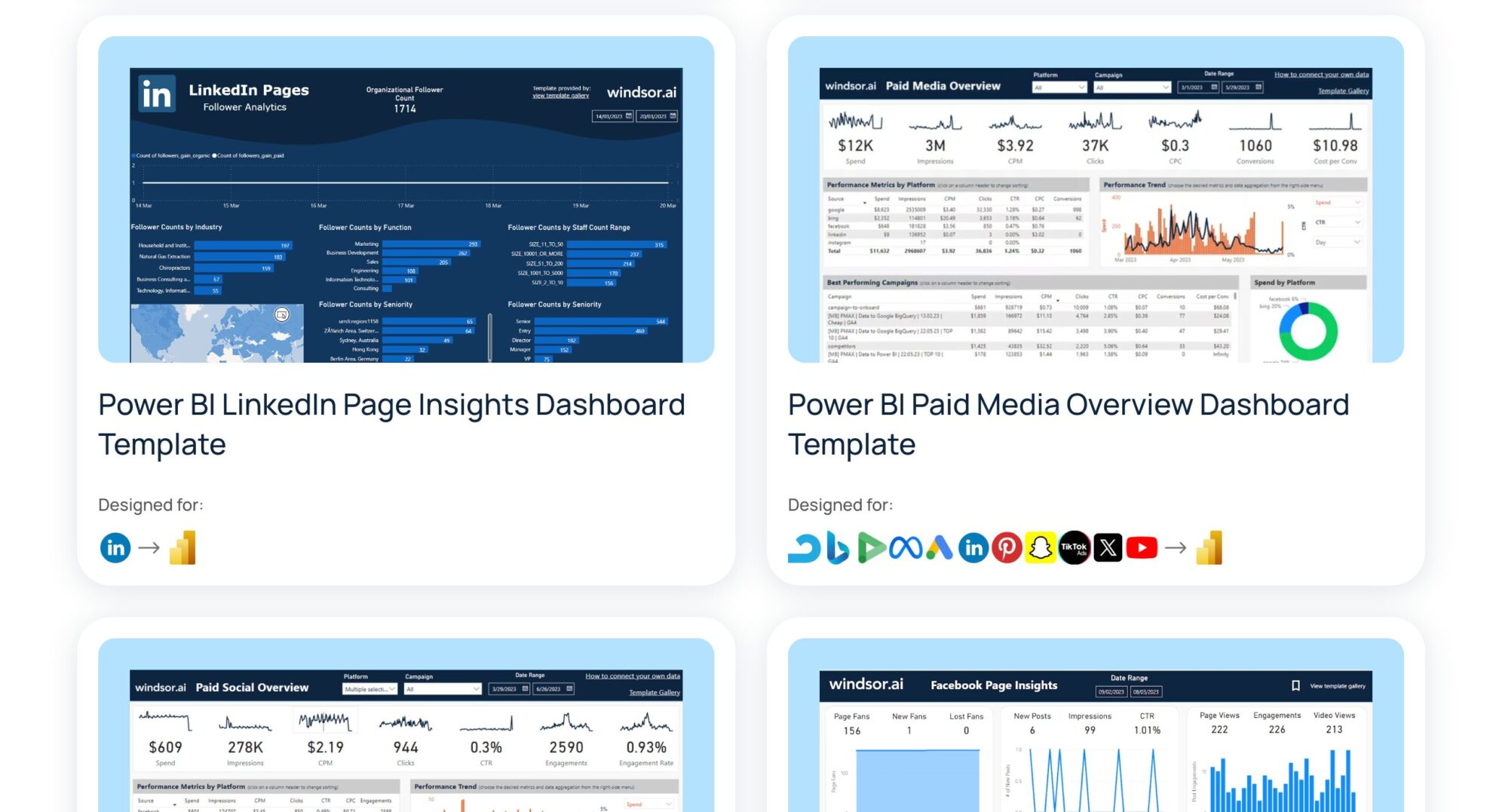



What is a marketing dashboard template?
A marketing dashboard template is a pre-designed framework or layout that helps marketers track and visualize key performance indicators (KPIs) and metrics related to their marketing efforts. It provides a centralized view of important data, allowing marketers to monitor the effectiveness of their campaigns and make informed decisions.
A typical marketing dashboard template includes the following fundamental elements:
- Key metrics: This section usually displays the most critical KPIs, including website traffic, conversion rate, leads generated, customer acquisition cost (CAC), and return on investment (ROI), among others.
- Traffic sources: This shows where your website traffic is coming from, including channels such as organic search, paid advertising, social media, and referrals.
- Conversion funnel: This part of the dashboard typically outlines the stages of the customer journey, starting from initial awareness through to conversion, and includes metrics such as click-through rate (CTR), conversion rate, and lead-to-customer conversion rate.
- Campaign performance: This feature displays data specific to marketing campaigns, including impressions, clicks, click-through rate, and cost per click (CPC), among others.
- Customer acquisition cost (CAC): This metric indicates the expense incurred to acquire a new customer and is essential for evaluating the effectiveness of your marketing efforts.
- Return on investment (ROI): This section helps you track the return on investment for different marketing channels or campaigns, indicating which ones are most effective.
- Customer lifetime value (CLV): This metric represents the total revenue a business expects to earn from a customer over the entire duration of their relationship. It’s important for understanding the long-term value of your customers.
- Heat maps or geographic data: Depending on your business, you might include geographic data to understand where your customers are located.
Templates can be created using various tools, such as Microsoft Excel, Google Sheets, Looker Studio, Power BI, or other specialized dashboard software. They can be customized to fit the specific needs and goals of a particular marketing team or campaign. By using a marketing dashboard template, marketers can save time and effort in organizing and analyzing data, enabling them to make more informed decisions to optimize their marketing strategies.
Advantages of using Windsor.ai's marketing dashboards
Tailor to your needs
Tailor to your needs
Windsor.ai’s marketing dashboards boast extensive customization to suit your specific requirements.
Monitor advertising performance
Monitor advertising performance
Our marketing dashboards enable you to closely track the effectiveness of your advertising initiatives.
Centralize team efforts
Centralize team efforts
Using marketing templates helps keep your team aligned and on the same page by providing a centralized view of key performance metrics.
Facilitate informed decision-making
Facilitate informed decision-making
By consolidating both hard metrics (e.g., return on investment, net present value) and web-based metrics (e.g., bounce rate, total visits, click-through rate), a good marketing dashboard empowers you to make more efficient and informed decisions.
Boost time and cost efficiency
Boost time and cost efficiency
Windsor.ai’s pre-designed templates save time that would otherwise be spent creating a dashboard from scratch. This can lead to cost savings by reducing the hours spent on manual dashboard creation.
FAQs
What are the data sources you can connect to Windsor.ai's templates?
You can extract data from a wide range of sources, including Instagram, LinkedIn ads, Facebook pages, Google ads, Google Analytics, HubSpot, TikTok Ads, Amazon Ads, Stripe, Criteo, and many more.
How can I create a comprehensive marketing dashboard?
Designing an effective digital marketing dashboard involves tailoring it to your audience. For instance, if the primary users are your marketing team, you can delve into detailed data and key metrics. Alternatively, if executives are the main audience, it’s advisable to emphasize high-level metrics and key performance indicators. Choose appropriate visualizations and ensure the dashboard is user-friendly and easily comprehensible. You can also consider adding vision board quotes to make your dashboards even more engaging and compelling.
Tired of manual data exports into BI tools and spreadsheets? Try Windsor.ai's templates today to automate your reporting

